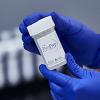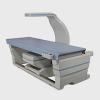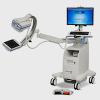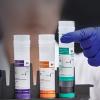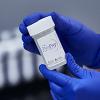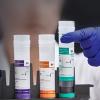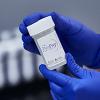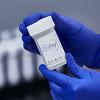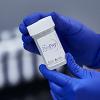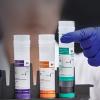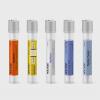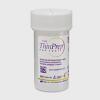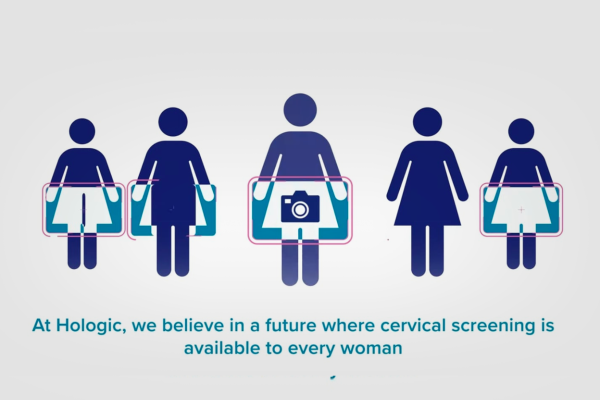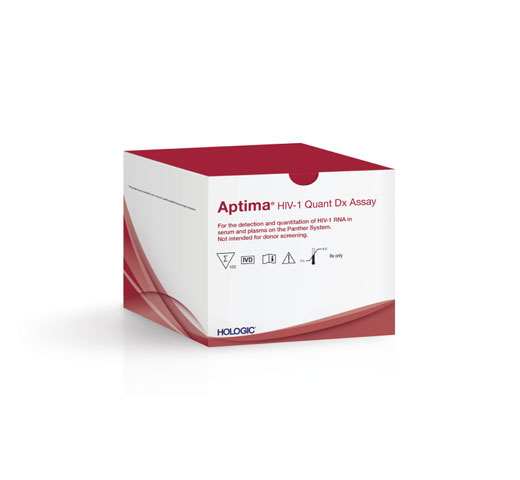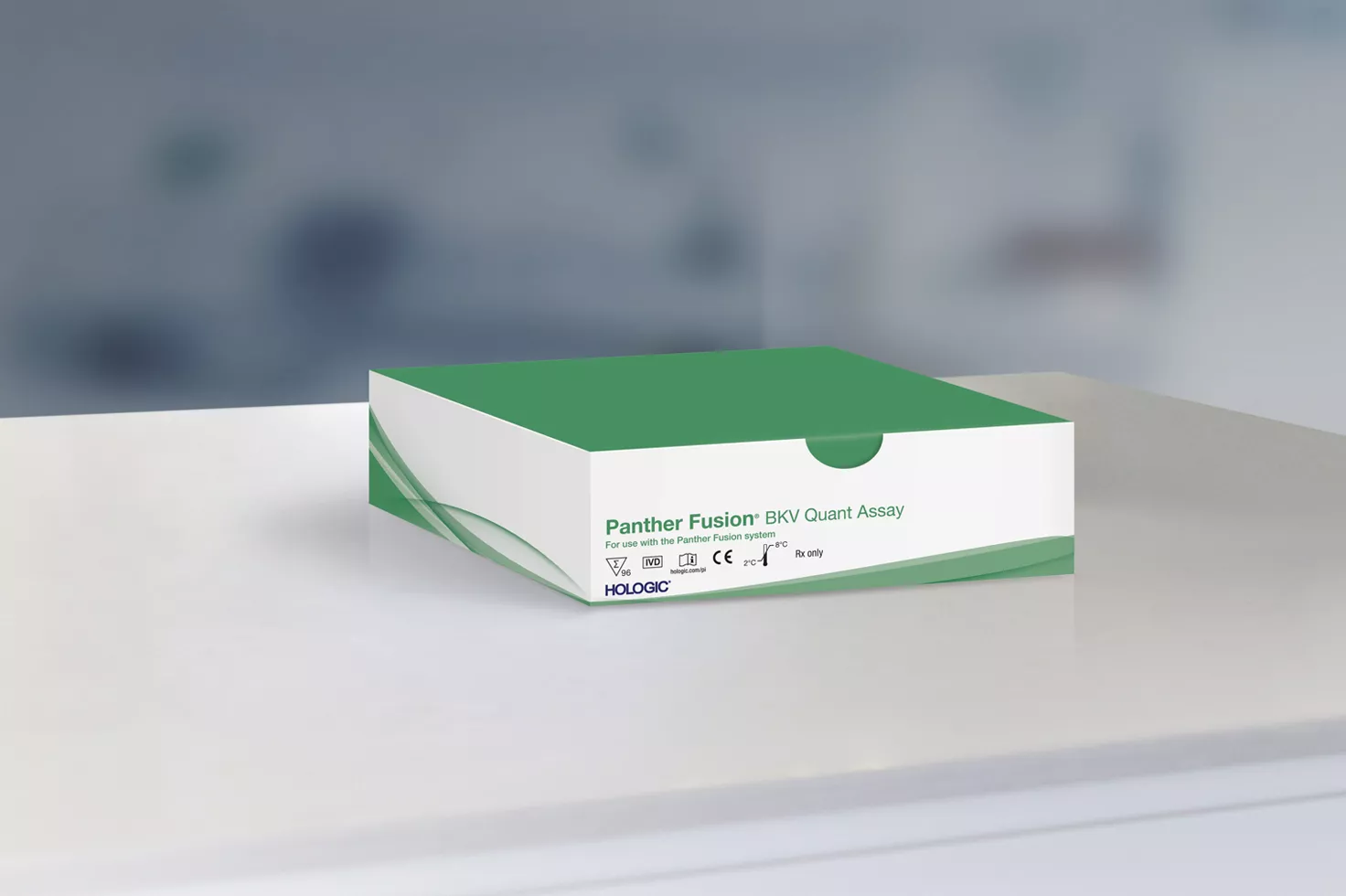
Validated Against Clinically Relevant Samples Types
A flexible approach for monitoring BKV infection. The Panther Fusion BKV Quant assay is intended for diagnosis and management of solid-organ and haematopoietic stem cell transplant patients.1
Sample-to-result Within a Single Integrated Instrument
The Panther Fusion BKV Quant assay on the Panther Fusion System combines assay performance with flexible automation for viral load monitoring.
Rapid Turnaround Time & Random Access
No more batching, simply load samples with different test orders as they arrive. STAT result option is available with the ability to prioritise results. First results in 2 hours, 41 minutes.2
Streamlined Plasma Processing
No need for aliquoting or manual sample transfer for plasma primary tube processing and both PPT and EDTA tubes are validated. Also, validated for urine processing and using pre-filled tubes for urine dilution, which are then loaded directly into the instrument.
Flexible Sample & Reagent Loading
Panther Fusion has ready-to-use, single-dose assay reagent cartridges, primary tube processing with positive sample identification and you can run multiple assays from a single specimen tube at the same time.
Consolidated Calibration & Controls
The Panther Fusion assay calibration is valid for up to 60 days. The Panther Fusion controls are valid for up to 30 days.1
Simplify and Scale the Future of Diagnostics
The Panther Fusion BKV Quant Assay is part of the Hologic Molecular Scalable Solution, a portfolio combining a broad, high performing assay menu with high throughput automation. Designed to flexibly scale to meet your needs, from a single patient result to population level screening.

High Performance, Walkaway Automation
The high reproducibility of the assay provides confidence that results are accurate, regardless of where they are performed.1
79 IU/mL
Plasma
LLoQ*
162 IU/mL
Urine
LLoQ*
1.90-9.00 log IU/mL
Plasma
Linear range
2.21-9.30 log IU/mL
Urine
Linear range
Take Control of your BKV Viral Load Testing1
- Intended use: BKV viral load monitoring.
- Technology: Real-time Polymerase Chain Reaction.
- Target region: VP2 gene • Validated sample types: Plasma and urine.
- Quantitative: Calibration curve valid for up to 60 days. Controls valid for up to 30 days.
- Sample Input Volume: Primary tube (EDTA, PPT): 1.2 mL plasma. Secondary tube: 700 μL plasma. Urine 2000 μL with automated dilution factor.

Quantitative NAAT Testing for Rapid & Sensitive Monitoring
BKV is a human polyomavirus which belongs to the papovaviridae family. Primary exposure to BKV occurs in childhood resulting in 80% to 90% of adults having developed antibodies against BKV.3 Viral reactivation occurs in immunocompromised individuals and renal transplant and haematopoietic stem cell transplant (HSCT) patients. BKV reactivation is important for HSCT recipients with late onset haemorrhagic cystitis occurring in 6% to 29% of patients within 2 months of transplantation.4 Recent guidelines recommend that kidney transplant patients should be regularly screened for BKV DNA levels in plasma post-transplant to identify those patients considered for pre-emptive treatment for nephropathy.5,6
Evidence. Insight. Collaboration.
Our education portal improves patient care through excellence in education, communication of clinical and scientific evidence, and partnerships with the healthcare community.
Insights
*Established using the 1st WHO International Standard. High correlation against a comparator assay on retrospective and contrived plasma and urine specimens across the linear range of the assay
Panther Fusion BKV Quant Assay [package insert]. AW-26020-001 Rev 001, San Diego, CA: Hologic, Inc.;2022.
Panther/Panther Fusion System Operator´s Manual. AW-26055-001 Rev 001, San Diego, CA: Hologic Inc.; 2022.
Muhsin SA, Wojciechowski D. BK virus in transplant recipients: current perspectives. Transplant Research and Risk Management. 2019;11:47-58 https://doi.org/10.2147/TRRM.S188021.
van Aalderen MC, Heutinck KM, Huisman C, et al. BK virus infection in transplant recipients: clinical manifestations, treatment options and the immune response. Neth J Med. 2012 May;70(4):172-183. PMID:264162.
Hirsch HH, Randhawa PS, AST Infectious Diseases Community of Practice. BK polyomavirus in solid organ transplantation– Guidelines from the American Society of Transplantation Infectious Diseases Community of Practice. Clin Transplant. 2019 Sep;33(9): e13528. doi:10.1111/ctr.13528. Epub 2019 Apr 10. PMID:30859620.
Dalianis T, Eriksson BM, Felldin M, Friman V, Hammarin AL, Herthelius M, et al. Management of BK-virus infection - Swedish recommendations. Infect Dis (Lond). 2019 Jul;51(7):479-484. doi: 10.1080/23744235.2019.1595130. Epub 2019 Apr 23. PMID: 31012777.
Documents
Safety Data Sheets
Package Inserts
Related Products
1434
Hologic BV, Da Vincilaan 5, 1930 Zaventem, Belgium.
Notified Body number wherever applicable
EC Representative Information wherever applicable



